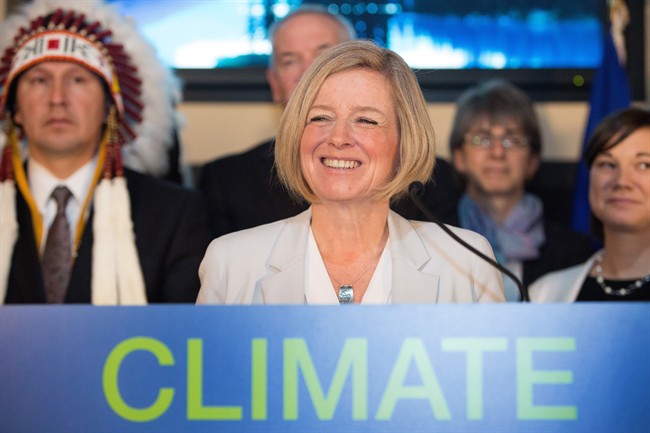Alberta’s climate change report released Sunday proposes a broad-based carbon tax of $30 a tonne by 2018 and the phase-out of coal-fired power by 2030. While many politicians, environmental groups and oil producers are supporting the plan, one policy analyst called it a “declaration of war on coal.” The Canadian Taxpayers Federation (CTF) denounced the proposal as an “unfair hit” to families, businesses and rural communities.

READ MORE: Reaction to Alberta’s ‘ambitious’ climate change plan
“The big loser are consumers; they were hoping for a tax that would hit producers only,” Duane Bratt, chair of the department of economics, justice and policy studies at Mount Royal University, said. “A carbon tax is simple: you’re going to be paying at every gas pump, you’re going to be paying it on home electricity and home heating.”
The CTF cited a government-commissioned climate change report that suggests the new tax could cost the average household $900 per year in 2030 if the pricing increases at two per cent above inflation.
Despite the impact on consumers, Bratt suggested the biggest loser is the coal industry.
“Basically this is a declaration of war on coal, and to say we want the end of coal by 2030. So you’re going to have TransAlta…the coal lobbyists and you’re also going to have municipality governments that rely on employment in those coal plants–rural municipalities are also going to be quite upset.”
READ MORE: Quick facts on Alberta’s climate change policy
TransAlta said in a statement Sunday night it is carefully reviewing the climate change policy to see how it would affect future business and strategy. The power generation company praised Notley for her commitment to a transition ensuring “system reliability and price stability” for customers.
“In the past six months we’ve seen a significant devaluation of our stock price due to the uncertainty of the future value of our coal assets in Alberta. The province’s 15-year transition, and the commitment to appoint a negotiator, confirms that Alberta does not intend to strand capital,” TransAlta CFO Donald Tremblay said in the release.
Bratt noted coal represents about 60 per cent of Alberta’s electricity, and was skeptical about wind energy acting as the primary replacement.
“While it’s windy today, I don’t think they can do it through wind; I think it’s really going to be through the use of natural gas plants.”
Watch below: Notley releases the government’s climate change plan
University of Alberta professor of environmental sociology and Intergovernmental Panel on Climate Change (IPCC) lead author Debra Davidson agrees the coal industry and its workers will be hardest hit, but suggested a manageable transition.
“The number of those employed in the coal industry is relatively modest and I am confident that with some retraining and placements they can be absorbed in other sectors of the economy, notably the emerging renewables sector,” Davidson wrote in an email to Global News.
Davidson said the coal phase-out is already in process, and the challenge will be providing necessary supports for the expansion of renewables within the mandated time frame.
“We are enduring a time of huge challenges and uncertainties that will affect us all regardless of policies introduced by our provincial government,” Davidson wrote. “The climate plan represents a means of navigating those challenges in a proactive way, and it is likely to deliver a more diversified economy.”
Watch below: Global’s Tom Vernon explains how the NDP government plans to tackle greenhouse gas emissions in Alberta
Bratt said he believes the climate plan will be the “signature policy objective of the NDP government, for better or for worse” and emphasized how ambitious it is.
“It’s a full-scale, consumer-based carbon tax that could raise about $3 billion,” he said. “The biggest winner really is the Notley government. This was a major plank they’d campaigned on, and it really puts Alberta at the forefront in Canada around climate change.”
But Bratt said the biggest question is what impact this will have on Alberta’s economy.
“Where does that $3 billion a year go? Is it going to go into green projects? Is it going to subsidize the wind industry? Is this going to go to mass transportation, or is this going to be used to pay down deficits?”
Davidson said the income generated will be “directly re-invested into Albertans.”
“Given B.C.’s experience with a carbon tax, moreover, the anticipated ‘tax burden’ on the economy can be expected to be minimal,” she added.
The CTF suggested tax credits given back to British Columbia residents didn’t benefit as many people as the carbon tax hurt, and pointed out the province froze its carbon tax in 2013 after the government admitted it was a burden on taxpayers.
WATCH: Reaction to Alberta’s climate change policy released Sunday.


Comments